May 16, 2022 | Non categorizzato
The new commandment of Jesus, love of one’s neighbour, is what the Word of Life suggests to us for the month of May 2022. It is a journey in which we can progress every day and where we find the fullness of Jesus’ message. “The whole of the Law is summarized in a single command: Love your neighbour as yourself” (Gal. 5:14 JB) This sentence comes from St Paul the Apostle. It is brief, precise, explicit and truly wonderful. It tells us that love of neighbour must be the basis and constant inspiration of the Christian way of life. For the Apostle, the fulfilment of the Law lies in practicing this command. The Law, in fact, speaks of not committing adultery, not killing, not stealing, not coveting…. And we know that those who love do not do these things. Those who love do not kill or steal, etc. Those who love, however, do not merely avoid evil. They are open to others; they desire good and accomplish it; they give of themselves, going so far as to give their very lives for their neighbour. For this reason, Paul writes that, when we love our neighbour, we are not merely observing a single command because — “the whole of the Law” is summarized in it. … If the whole of the Law is summed up in love of neighbour, the other commandments should be seen as means to enlighten and guide us in finding the way to love others in the often complex situations of life. We become aware of God’s purpose in giving us the other commandments, of his will as expressed in. them. He wants us to be obedient, chaste, mortified in our passions, meek, merciful, poor and so on, in order to better fulfil the commandment of love.
Chiara Lubich
(Chiara Lubich, in Parole di Vita, Città Nuova, 2017, pp. 263/4)
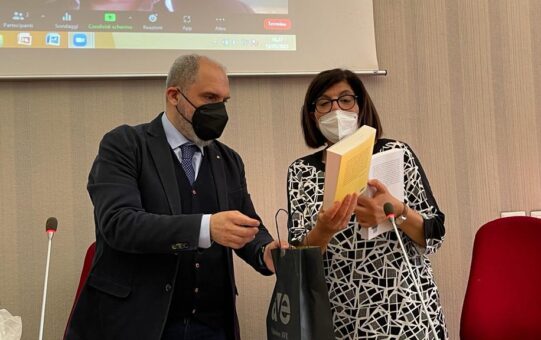
May 14, 2022 | Non categorizzato
Catholic Action and Focolare Movement get together, starting from local Churches, in education and for integral ecology. To “live” the present and the future of our neighbourhoods together and in a practical way. A partnership agreement was made between the Italian Catholic Action (CA) and the Focolare Movement (FM). An alliance that, as Giuseppe Notarstefano, National President of CA underlined, combines the foundational value of a partnership that will become ever more concrete through the importance of appreciating one another, of acting together. The third meeting between the Presidency of the Italian Catholic Action and that of the Focolare Movement took place on Friday, 13th May in Rome, at the National CA Centre in Via Aurelia. Recalling the words spoken by Chiara Lubich, founder of the Focolare, during the bombings of Trent during the Second World War, “Love conquers everything”, Margaret Karram, President of the Focolare Movement, underlined the mutual desire of a partnership that, believing in this certainty, is able to realize the projects and dreams of the two organizations, to be ever more and together, a gift for the Church.  Following two hours of prayer, getting to know one another, discussion and dialogue, it was decided that the FM and CA would initiate and consolidate projects at a local level in various places, starting from the dialogue that comes from life, to restore strength and momentum together with local communities and work in a partnership that is increasingly concrete and intergenerational, which promotes kindness, tenderness, as a way of being and being together, as desired by Pope Francis in the encyclical All Brothers (Tutti Fratelli). Three themes were chosen: 1) the Global Educational Pact; 2) Civil Economy, Political Commitment and Integral Ecology; 3) Ecumenism and Interreligious Dialogue. President Notarstefano expressed the desire to concretely “live” together in the various places, ensuring presence and passion in the networks of dialogue in the local Churches, encouraging and supporting each other to live this path of concreteness, patience and dedication. It is important that, in the current scenario of general disorientation, places of fraternity are created at grassroots level, which, in the storm of what is happening around us, become boats to which people can cling. We wish to testify that working together is possible, in order to generate fraternity, also through a joint, national symbolic initiative that gives value to those who strive to build a greater “we”, in education, for integral ecology, to participate together, also in politics, in a generative path open to other realities, which is an investment in the service of future generations, for the promotion of the person. Margaret Karram, President of the Focolare, said that the commitment to come together in different cities, will bring out the many different concrete actions that can be carried out in the local Churches. To this end, a working group was set up, which will be coordinated by Michele Tridente (CA) and Patrizia Bertoncello (FM), to evaluate the proposals that emerged from Friday’s meeting and consider possible ways to collaborate, through which the two organizations will be open to other realities, to contribute to growth in the various areas and local communities.
Following two hours of prayer, getting to know one another, discussion and dialogue, it was decided that the FM and CA would initiate and consolidate projects at a local level in various places, starting from the dialogue that comes from life, to restore strength and momentum together with local communities and work in a partnership that is increasingly concrete and intergenerational, which promotes kindness, tenderness, as a way of being and being together, as desired by Pope Francis in the encyclical All Brothers (Tutti Fratelli). Three themes were chosen: 1) the Global Educational Pact; 2) Civil Economy, Political Commitment and Integral Ecology; 3) Ecumenism and Interreligious Dialogue. President Notarstefano expressed the desire to concretely “live” together in the various places, ensuring presence and passion in the networks of dialogue in the local Churches, encouraging and supporting each other to live this path of concreteness, patience and dedication. It is important that, in the current scenario of general disorientation, places of fraternity are created at grassroots level, which, in the storm of what is happening around us, become boats to which people can cling. We wish to testify that working together is possible, in order to generate fraternity, also through a joint, national symbolic initiative that gives value to those who strive to build a greater “we”, in education, for integral ecology, to participate together, also in politics, in a generative path open to other realities, which is an investment in the service of future generations, for the promotion of the person. Margaret Karram, President of the Focolare, said that the commitment to come together in different cities, will bring out the many different concrete actions that can be carried out in the local Churches. To this end, a working group was set up, which will be coordinated by Michele Tridente (CA) and Patrizia Bertoncello (FM), to evaluate the proposals that emerged from Friday’s meeting and consider possible ways to collaborate, through which the two organizations will be open to other realities, to contribute to growth in the various areas and local communities.
Sara Fornaro
May 13, 2022 | Non categorizzato
To participate in a film competition and then use the cash prize to help others. With United World Week (SMU) 2022 just days away, we share an experience that comes straight from Jordan. A true action of integral ecology carried out by the teens of the Focolare in the wake of the #DARETOCARE campaign. “I would like to invite you to embark, together, on a journey. A journey of transformation and action. Made up not so much of words, but above all, of concrete and urgent action. (…) Integral ecology is an invitation to an ‘integral’ vision of life, starting from the conviction that everything in the world is connected (…)”. With these words, Pope Francis addresses, through a video message, the participants of the “Countdown” TED’s digital event on climate change, held in October 2020. An invitation to “act” concretely, for the good of the planet and all of us: to care for the common home and meet the needs of its inhabitants. It’s enough to start with small actions, as these Gen 3 from Jordan did, who, with a keen eye on #DARETOCARE, really succeeded in creating a ‘virtuous’ circle by presenting their short film on ecology ‘Nature Karma’ at the Middle Eastern Film Festival. Talking about the importance of caring for the environment and winning an award was just the first step in deciding, with conviction, to want to help others.
Edited by Maria Grazia Berretta
https://youtu.be/7iQylkfn4kk
May 10, 2022 | Non categorizzato
The new commandment calls us to make space within ourselves for the power of Jesus’ boundless love and to allow its wonderful sound to echo forth. It means understanding just how precious is the immense love that we have received without merit and ensuring that it circulates among others. A successful approach We have been married for less than fourteen years and never had any real crisis. Both of us have Christian backgrounds; nevertheless, we are aware that conjugal love can be very fragile. The greatest challenge is bringing up children and this can lead to disagreements. For example, when it comes to disciplining them, I would be more lenient than Pavel. Sometimes I defend them irrationally. In this situation, I am helped by thinking that my husband also wants what is best for them and I try to respect what he feels is his duty as a father (It is also true to say that I often realise that he is right). I pray when I don’t know what to do. We also try to implement the words recommended by Pope Francis: “Please, thank you, I am sorry”, and “may the sun not set on your anger”. From my own experience, I think it is important to respect the time the other person may take to deal with a difficult situation. At such times, I try to express my love with a kiss or a caress. Marriage truly teaches us to relate to the other person . We have seen how “successful” it is to praise our husband or wife – even for the smallest things. Pavel is a master of this approach. (K.S. – Czech Republic) The guest Since the beginning of the pandemic, our community has made a point of keeping in touch with all the members of the group to make sure everyone was well, especially the people who were alone. When one of them who was normally very active fell and broke her right arm, my husband and I offered her hospitality for a while. She accepted. In the meantime, in view of the end-of-year festivities, new, more restrictive health regulations were being imposed, and since our guest would be isolated for Christmas and New Year, we suggested that she extend her stay with us. Impressed by the true family spirit of our community, she attributed it to the implementation of Jesus’ precept: “What you did for one of the least of these brothers, you did for me”. When she was physically more independent and returned to her home, she was aware that the Gospel could become a foundation for life and she immediately started to help those who might be in need. (Constance – Canada) “That” violin When I was twelve, my parents’ marriage ended, but for another ten years we continued to live in the same flat: my mother and I lived in one room and my father in the other. The rest of the flat was shared by us all. The divorce drama made me insecure and fearful. Having sided with my mother, I had to give my father back the violin I was using for practice. When I grew up, I wanted to introduce him to my fiancé but he did not want to see him. He did not come to our wedding and did not even want to meet the two grandchildren when they were born. However, we did not give up and, in order to live our Christian faith consistently, we tried to forget old wounds and we continued to write to him and invite him to our home. Finally, one day he came to meet his son-in-law and grandchildren. Feeling loved, he gradually began to stay longer and longer and bring gifts to the children. When he heard that one of them was learning to play the violin, he brought “that” violin back. (S. – Hungary)
Edited by Maria Grazia Berretta
(excerrpts from Il Vangelo del Giorno, Città Nuova, year VIII, no.2, May – June 2022)
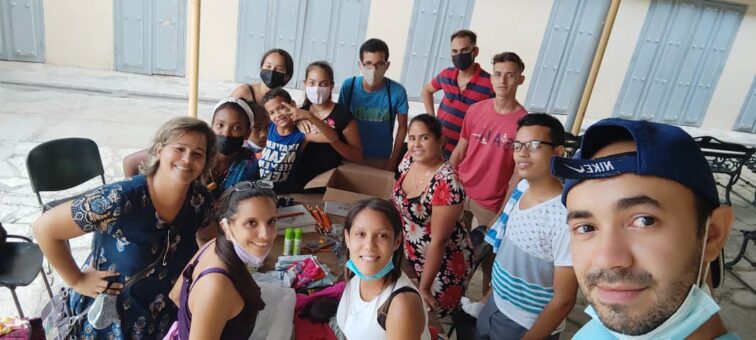
May 9, 2022 | Non categorizzato
This year too, the United World Week (UWW) gave space to global events and actions for peace and fraternity that focused on “Caring”, with a particular focus on integral ecology. The #Daretocare Campaign will continue for another year.
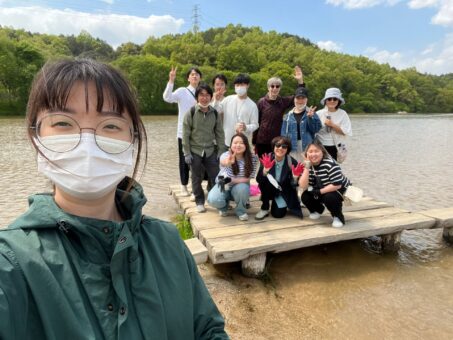
Korea – © UWP
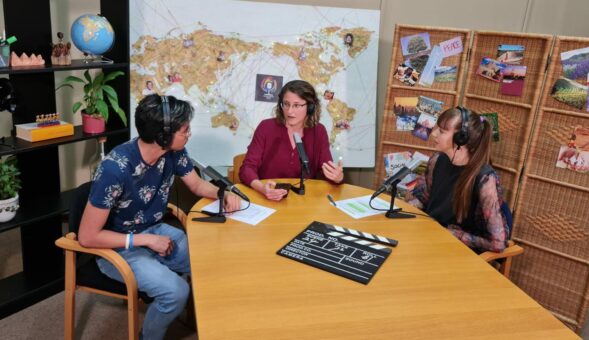
United World Week Podcast – © UWP

Cuba – © UWP
Paolo Balduzzi
May 9, 2022 | Non categorizzato
In his first letter, St John states: Anyone who does not love their brother or sister who they see, cannot love God who they don’t see.(1Jn.4,20) In this extract, Chiara Lubich reflects on how love for each neighbour, brother or sister whom we meet is an obligatory passage for going to God, for feeling union with him. There is a system which is typically ours so we can be sure that we are walking on a right path that will certainly take us to our goal which is God. It has an obligatory passage, and this is called our brother or sister. Let’s throw ourselves into loving every brother or sister we meet during the day. Let’s set alight in our hearts the ardent and praiseworthy desire that God surely wants. It’s the desire to love every neighbour, making ourselves one with him or her in everything, with a disinterested love and without imposing limits. (…) Love will give new life to relationships and to people, and it will prevent us from being selfish. In fact, love will be the best antidote. (…) In this way we will be able to prepare a gift for Jesus. This will be abundant fruit and our heart that is filled with fire and consumed with love. The motto then that will help to remind us of this decision could be: to God through my brother or sister!
Chiara Lubich
(Chiara Lubich, Conversazioni, Città Nuova, 2019, pag. 100)
May 3, 2022 | Non categorizzato
The Focolare Movement’s Emergency Coordination continues to raise funds for Ukraine. Father Vyacheslav Hrynevych, executive director of Caritas Spes Ukraine sent us this short video with a thank you directly from one of the distribution centres. https://youtu.be/co7-47VjQ74 For those who would like to contribute Azione per un Mondo Unito ONLUS (AMU) IBAN: IT 58 S 05018 03200 000011204344 presso Banca Popolare Etica Codice SWIFT/BIC: ETICIT22XXX Azione per Famiglie Nuove ONLUS (AFN) IBAN: IT 92 J 05018 03200 000016978561 presso Banca Popolare Etica Codice SWIFT/BIC: ETICIT22XXX Causale: Emergenza Ucraina
May 2, 2022 | Non categorizzato
The word of life for May 2022 suggests that we put into practice the new commandment of Jesus: mutual love. By looking beyond differences- which are so emphasized in the present time- we can give life to real communities that reveal the great novelty of the Gospel You know that Jesus is present, for example, in the sacraments. In the Eucharist, for instance, he becomes truly present. Jesus is also there wherever mutual love is lived. He said: ‘Where two or three are gathered in my name’ (and this is possible through reciprocal love) ‘I am there among them.’[1] And also in a community where life is deeply rooted in mutual love, he can continue to be actively present. And through the community, he can continue to reveal himself to the world and influence the world. Isn’t this wonderful? Doesn’t it make you want to start right now to live this love with your fellow Christians? According to Saint John,(…) mutual love is the foremost commandment of the Church, whose vocation is, in fact, to be communion, fellowship, to be unity. (…) If, therefore, you want to find the true mark of the authentic disciples of Christ; if you want to know their distinctive characteristic, you will find it in the mutual love they live. Christians are recognized by this sign. If it is missing, the world will no longer be able to find Jesus in the Church. Reciprocal love creates unity. But, what does unity achieve? ‘That they may all be one’ – Jesus continues – ‘so that the world may believe…’[2] Unity, by revealing the presence of Christ, draws the world to follow him. When people see mutual love and unity being lived, they believe in him.
Chiara Lubich
Chiara Lubich, in “Parole di Vita”, [Words of Life] Citta Nuova, 2017, pages 171/2 [1] Mt 18:20. [2] Jn 17:21.
Apr 30, 2022 | Non categorizzato
On 30th April 1982, 7,000 priests, religious and seminarians from all over the world, united by the spirituality of unity, gathered in Rome for the event “The Priest Today, the Religious Today”. Forty years later we look back at that day. Priests who feel called to be first and foremost witnesses of the Gospel and men of dialogue; religious who have found in the spirituality of the Focolare Movement an incentive to embody more fully the charism of their founders; seminarians who have understood that they want to choose God and to confirm their own calling. These are the experiences of many of the participants at the International Congress entitled “The Priest Today, the Religious Today”, held on 30th April 1982 in the Nervi Hall, in the Vatican. 7,000 people took part in that Congress. Through testimonies from all over the globe, they highlighted the fruits of the encounter of the charism of unity with ministers of the Catholic Church and other Churches and the renewal brought to many religious communities. In her speech that day, Chiara Lubich stressed the two focal points of this experience: Jesus crucified and forsaken as the model of the priest and the religious; mutual love and unity as the style and purpose of their mission. To be men of “dialogue”. This is the mandate that, even then, contained the desire of an outgoing Church, as can be seen from the words of the foundress of the Focolare, more relevant than ever today: “Never as in today’s times, is the Church called to look beyond herself to all Christians, to those who have different beliefs or who do not believe at all. Never before is it so evident that what some call “the missionary mandate of the Fourth Gospel” comes to the fore. John expresses it in these terms: ‘By this everyone will know that you are my disciples, if you love one another’. (…) Today Christians are called to evangelize in this way too: loving one another and offering the experience of their new life to others. This cannot fail to touch, to amaze and to provoke questions. And hence dialogue flourishes”. On that day the then Holy Father, John Paul II, presided over “the greatest concelebration since the institution of the Eucharist,” as the Roman Observer called it. It was a moment of joy and sharing, an opportunity to take stock, a starting point for new developments. Today, 40 years later, let’s hear the story of some of the participants.
Edited by Maria Grazia Berretta
https://youtu.be/4Y-PNuJGN4A
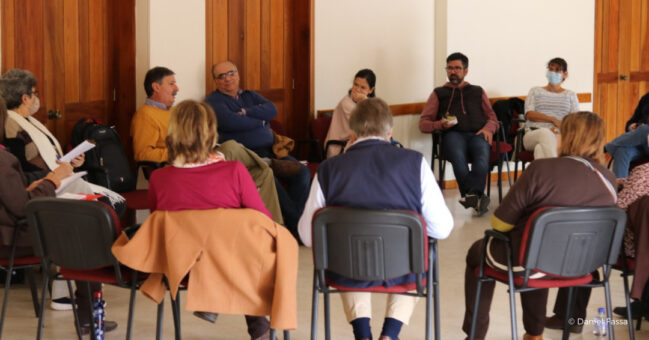
Apr 28, 2022 | Non categorizzato
Expanding horizons of learning. From 27 March to 2 April in Colombia a meeting on “University, knowledge and wisdom: a perspective for Latin America”. A seat in Latin America for Sophia UI. Openness and graduality. These were the guiding principles of the meeting “University, knowledge and wisdom: a perspective for Latin America”, held at Tocancipá, Colombia from March 27 to April 2. It brought together Giuseppe Argiolas, Rector of the Sophia University Institute, with the members of a multi-disciplinary intercultural commission which over the past ten years has been working to build the foundations for a Latin American seat of the university. The General Council of the international Focolare Movement was represented by Francisco Canzani and Renata Simon. 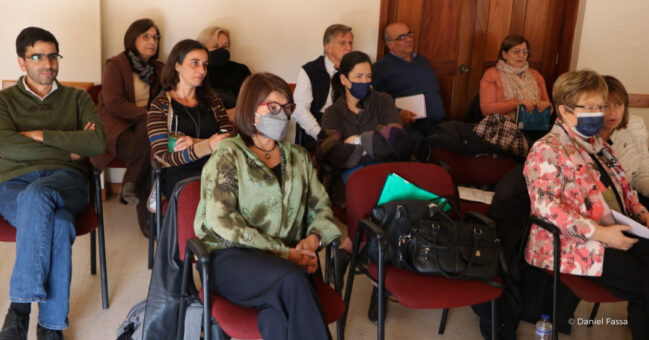 At the heart of their considerations were the guidelines from the Congregation for Catholic Education for the development of a project unprecedented in the history of pontifical universitities. Namely, that the individual units of the Sophia University Institute, even if situated in different continents, can be considered part of a single global university, with its headquarters based at Loppiano, near Florence, Italy. If approved, the Sophia ALC (Latin America and Caribbean) project will be the first step in the formation of this “university network”, with three geographical branches. In Argentina a proposed Master in “Integral Ecology and Interculturalism” delivered in hybrid modality (in person and online); in Brazil a degree course in “Education directed towards Integral Human Development”; in Mexico university extension courses, available mainly online.
At the heart of their considerations were the guidelines from the Congregation for Catholic Education for the development of a project unprecedented in the history of pontifical universitities. Namely, that the individual units of the Sophia University Institute, even if situated in different continents, can be considered part of a single global university, with its headquarters based at Loppiano, near Florence, Italy. If approved, the Sophia ALC (Latin America and Caribbean) project will be the first step in the formation of this “university network”, with three geographical branches. In Argentina a proposed Master in “Integral Ecology and Interculturalism” delivered in hybrid modality (in person and online); in Brazil a degree course in “Education directed towards Integral Human Development”; in Mexico university extension courses, available mainly online.  Over the six day meeting, the commission members concentrated on forming strategies for the gradual implementation of this complex project in all its aspects, including conforming to ecclesial norms as well as to local legislation, economic sustainability, fundraising and publicity, infrastructure and curriculum development. The result was a growing certainty that the moment has arrived to extend even further the horizons of “unity in diversity” experienced by the Sophia ALC team members, who come from Argentina, Brazil, Colombia, Costa Rica, Mexico and Uruguay, and from academic disciplines as diverse as administration, communications, economics, education, history, law, philosophy, sociology and theology. It is clear that the future of the project will depend on a continuing and deepening dialogue between the rector and academic staff of Sophia, the Focolare Movement leadership team, and above all with the Congregation for Catholic Education to indicate the channels along which this dream of Chiara Lubich can be gradually brought to fruition, in this case in the Latin American continent.
Over the six day meeting, the commission members concentrated on forming strategies for the gradual implementation of this complex project in all its aspects, including conforming to ecclesial norms as well as to local legislation, economic sustainability, fundraising and publicity, infrastructure and curriculum development. The result was a growing certainty that the moment has arrived to extend even further the horizons of “unity in diversity” experienced by the Sophia ALC team members, who come from Argentina, Brazil, Colombia, Costa Rica, Mexico and Uruguay, and from academic disciplines as diverse as administration, communications, economics, education, history, law, philosophy, sociology and theology. It is clear that the future of the project will depend on a continuing and deepening dialogue between the rector and academic staff of Sophia, the Focolare Movement leadership team, and above all with the Congregation for Catholic Education to indicate the channels along which this dream of Chiara Lubich can be gradually brought to fruition, in this case in the Latin American continent.
Daniel Fassa






 At the heart of their considerations were the guidelines from the Congregation for Catholic Education for the development of a project unprecedented in the history of pontifical universitities. Namely, that the individual units of the Sophia University Institute, even if situated in different continents, can be considered part of a single global university, with its headquarters based at Loppiano, near Florence, Italy. If approved, the Sophia ALC (Latin America and Caribbean) project will be the first step in the formation of this “university network”, with three geographical branches. In Argentina a proposed Master in “Integral Ecology and Interculturalism” delivered in hybrid modality (in person and online); in Brazil a degree course in “Education directed towards Integral Human Development”; in Mexico university extension courses, available mainly online.
At the heart of their considerations were the guidelines from the Congregation for Catholic Education for the development of a project unprecedented in the history of pontifical universitities. Namely, that the individual units of the Sophia University Institute, even if situated in different continents, can be considered part of a single global university, with its headquarters based at Loppiano, near Florence, Italy. If approved, the Sophia ALC (Latin America and Caribbean) project will be the first step in the formation of this “university network”, with three geographical branches. In Argentina a proposed Master in “Integral Ecology and Interculturalism” delivered in hybrid modality (in person and online); in Brazil a degree course in “Education directed towards Integral Human Development”; in Mexico university extension courses, available mainly online.